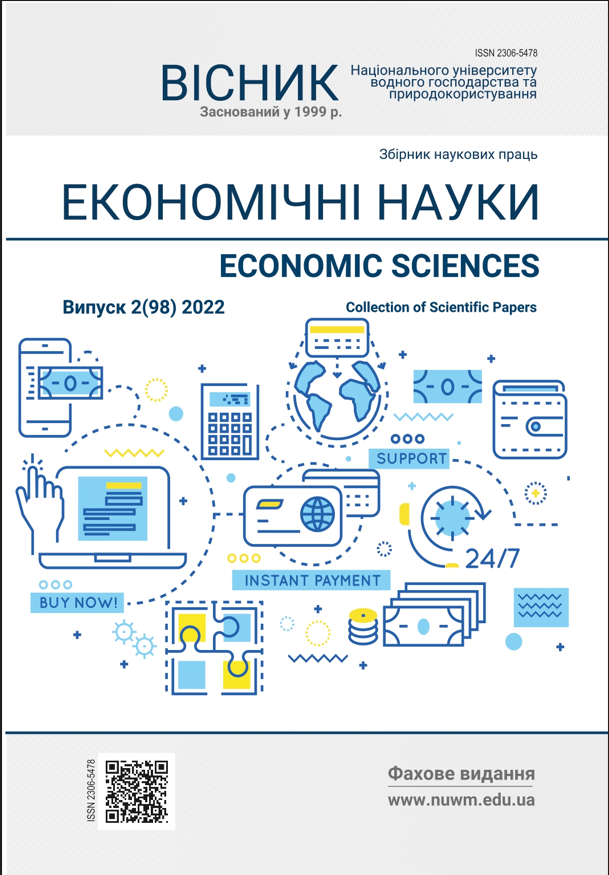BUSINESS PROCESSES OF IMPLEMENTATION OF THE CONCEPT OF ECOLOGICAL AND ECONOMIC SECURITY OF AGRICULTURAL NATURE USE FORMATION
DOI:
https://doi.org/10.31713/ve2202221Keywords:
concept, security, agrarian nature management, main business processes, process approach.Abstract
The article discloses the main business processes in the implementation of the concept of ecological and economic security of agrarian nature use. In particular, this is a scientific-methodological, resource and socio-ecological-economic justification of the processes of ensuring socio-ecological-economic security in the use of land resources according to world standards in the conditions of global and regional changes. To implement the concept, it is necessary to implement innovative business processes in the areas of: environmental management, audit, expertise, insurance, licensing, information and environmental economics, metrology, standardization, certification, project management, etc. In particular, it is necessary to organize the development of the regulatory nature of the types of activities that are subject to audit and voluntary environmental certification and the regulatory documents to which they must comply.To implement the concept, it is necessary to implement innovative business processes in the areas of: environmental management, audit, expertise, insurance, licensing, information and environmental economics, metrology, standardization, certification, project management, etc. In particular, it is necessary to organize: development of a regulatory and legal nature (develop legal foundations and determine the list of types of activities, products, NPS objects and territories that are subject to audit and voluntary environmental certification and regulatory documents to which they must comply).The stages and sequence of implementation of the concept in Ukraine will depend on: the development and terms of approval of the concept, the correction of legislative and regulatory documents, their compliance by all levels and authorities and businesses, the implementation of requirements for Ukraine’s accession to the EU, as well as the formation of innovative business processes.The main business processes for the implementation of the concept have been developed in the article: identification of adverse effects on the environment; assessment of facts and events; determination of the structure of agrarian nature management; quantitative assessment of safety; making a decision on the introduction and control of the practice of managing the safety of agricultural nature use; introduction of an effective audit and certification system (including environmental ones).References
Гуторов А. О., Гуторов О. І., Грошев С. В. Управління ефективністю використання земельних ресурсів фермерських господарств: теорія та практика сталого землекористування : монографія / Нац. наук. центр «Ін-т аграр. Економіки». Харків : Друкарня Мадрид, 2020. 223 с.
Добряк Д. С., Вiтвицька В. М. Грошова оцінка земель як важливий чинник регулювання ринку сільськогосподарських земель. Землеустрій і кадастр. 2010. № 1. С. 5–16.
Ходаківська О. В., Юрченко І. В. Нормативна грошова оцінка земель сільськогосподарського призначення: рентоутворюючі чинники. Землевпорядний вісник. 2017. № 7. С. 14–18.
Хромяк Тетяна Василівна. Удосконалення методики ринкової оцінки земель сільськогосподарського призначення в Україні : автореф. дис. … канд. екон. наук : 08.07.02. Луганськ, 2003. 23 с.
The High Level Panel of Experts on Food Security and Nutrition (HLPE)… URL: www.fao.org/cfs/cfs-hlpe (дата звернення: 05.06.2022).
Rosset P. M., Sosa B. M., Jaime A. M. R. & Lozano D. R. A. The Campesino-toCampesino agroecology movement of ANAP in Cuba: social process methodology in the construction of sustainable peasant agriculture and food sovereignty. The Journal of Peasant Studies. 2011. Vol. 38. Issue 2. Р. 161–191. doi:10.1080/03066150.2010.538584
Wezel A., Goris M., Bruil J., Félix G. F., Peeters A., Bàrberi P., Bellon S. & Migliorini P. Challenges and actions points to amplify agroecology in Europe. Sustainability. 2018. 10(5). Р. 1598. URL: https://doi.org/10.3390/su10051598 (дата звернення: 05.06.2022).
Ceres Investor Network on Climate Risk and Sustainability. URL: https://www.ceres.org/networks/ceres-investor-network (дата звернення: 05.06.2022).
Sustainable Banking Network – Members. International Finance Corporation, World Bank Group. URL: https://www.ifc.org/wps/wcm/connect/topics_ext_content/ifc_external_corporate_site/sustainability-at-ifc/company-resources/sustainable-finance/sbn_members. (дата звернення: 05.06.2022).
The Green Growth Action Alliance Unlocking private finance for green growth. World Economic Forum, June 2013. URL: http://www3.weforum.org/docs/WEF_GreenGrowth_G2A2_Overview_2013.pdf. (дата звернення: 05.06.2022).
Orhan Dengiz, Mustafa Usul. Multi-criteria approach with linear combination technique and analytical hierarchy process in land evaluation studies. Eurasian J Soil Sci. 2018. 7(1). P. 20–29.
Berawi M. A., Suwartha N., Salsabila F., Gunawan, Miraj P. and Woodhead R. Land value capture modeling in commercial and office areas using a big data approach. International Journal of Technology. 2019. Vol. 10. No 6. P. 1150–1156. URL: https://doi.org/10.14716/ijtech.v10i6.3640. (дата звернення: 05.06.2022).
Defuzzification in the process of managerial estimating / Tetiana Ostapchuk, Kateryna Orlova, Svitlana Biriuchenko, Andrii Dankevych, Galyna Marchuk. Agricultural and Resource Economics. 2021. Vol. 7. No 4. P. 62–65.
Defuzzification in the process of managerial estimating the value of agricultural lands / Ostapchuk T., Orlova K., Biriuchenko S., Dankevych A. & Marchuk G. Agricultural and Resource Economics : International Scientific E-Journal. 2021. 7(4). P. 62–81. URL: https://doi.org/10.51599/are.2021.07.04.04. (дата звернення: 05.06.2022).
Podhrázská J., Kučera J., Karásek P., Konečná J. Land degradation by erosion and its economic consequences for the region of South Moravia (Czech Republic). Soil & Water Res. 2015. № 10. 105–113.
Applied Aspects of Humus Balance Modelling in the Rivne Region of Ukraine / Petro Skrypchuk, Viktor Zhukovskyy, Halyna Shpak, Nataliia Zhukovska, Halyna Krupko. Journal of Ecological Engineering. August 2020. Vol. 21, Issue 6. P. 42–52. URL: https://doi.org/10.12911/22998993/123255 (дата звернення: 05.06.2022).
Khalep Y. & Moskalenko A. Ecological and economic aspects of the efficiency of Polissia organic plant models. Agricultural and Resource Economics : International Scientific E-Journal. 2020. Vol. 6(4). P. 5–19. URL: https://doi.org/10.51599/are.2020.06.04.01 (дата звернення: 05.06.2022).
Marsden T. From post-productionism to reflexive governance: contested transitions in security more sustainable food futures. Journal of Rural Studies. 2013. № 29. Р. 123–134. doi: 10.1016/j.rurstud.2011.10.001
Агроэкологические и другие инновационные подходы в поддержку устойчивых сельскохозяйственных и продовольственных систем, повышающих уровень продовольственной безопасности и качество питания. Доклад Группы экспертов высокого уровня по вопросам продовольственной безопасности и питания 17 июля 2019 года. URL: www.fao.org/cfs/cfs-hlpe (дата звернення: 05.06.2022).
Многосторонние партнерские механизмы финансирования и укрепления продовольственной безопасности и улучшения питания в рамках осуществления Повестки дня на период до 2030 года. URL: https://www.fao.org/3/CA0156RU/ca0156ru.pdf (дата звернення: 05.06.2022).
Директива Європейського Парламенту та Ради 2003/4/ЄС від 28.01.2003 про доступ громадськості до інформації про навколишнє природне середовище та про скасування Директиви Ради 90/313/ЄЕС.

